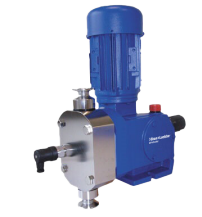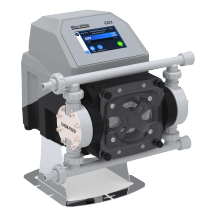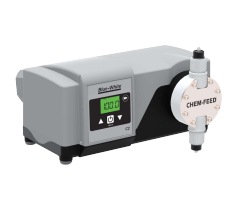Diaphragm pumps are positive displacement pumps that use a flexible diaphragm to displace liquids, and they are commonly used for the transfer of corrosive, viscous, and abrasive liquids. Diaphragm pumps have different types, including air-operated, hydraulic, electric, pneumatic, and mechanical diaphragm pumps. They offer several advantages such as self-priming, dry running, no contamination, high efficiency, versatility, easy maintenance, and safe operation. Diaphragm pumps are widely used in several industries, including chemical, pharmaceutical, food and beverage, oil and gas, mining, and water treatment.



Diaphragm Pumps
3 series from 2 manufacturers
-
- Acetate
- Adhesives
- Agriculture
- Bakery and confectionery
- Beauty & Personal Care
- Brewing and beverages
- Ceramics
- Chemical
- Convenience food
- Dairy
- Detergents
- Distilleries
- Drinking Water
- Fish Farming
- Food & Beverage
- Heating, Water & Sanitation
- Meat Processing
- Oil & Gas
- Oil Fats & Mayonnaise
- Paint & Surface Coating
- Paper Mills
- Petrochemical
- Pharmaceutical
- Plastic
- Polymer Extraction
- Research & Development
- Surface Finishing
- Textile
- Wastewater
- Water Treatment
-
- Analysis
- Booster
- Circulation
- Cleaning
- Control
- Conveying
- Cooling
- Descaling
- Desinfection
- Dewatering
- Diagnostic
- Discharge
- Distribution
- Dosing
- Drain
- Drainage
- Dual Dispensing
- Feed
- Filling
- Filtration
- Flow Control
- Greasing
- Grinding
- Handling
- Heating
- High-Pressure
- High-Temperature
- High-Volume
- Injection
- Irrigation
- Level Control
- Lift
- Lifting
- Loading
- Low-Pressure
- Lubrication
- Medium-Pressure
- Metering
- Mixing
- Off-loading
- Powder Coating
- Pressurisation
- Process
- Processing
- Recirculation
- Recovery
- Refueling
- Replacement
- Rinsing
- Sampling
- Settling
- Spraying
- Tempering
- Transfer
- Treatment
- Ultra High-Pressure
- Unloading
- Volumetric Dispensing
- Washing
- Water-Jet Cleaning
- Water-Jet Cutting
-
- Abrasive Liquids
- Acetate
- Acids
- Adhesives
- Alcohols
- Ammonia
- Beer
- Bitumen
- Carbon Fibers
- Caustic Solutions
- Cereals
- China Clay Slurry
- Chocolate
- CIP Fluids
- Clay
- Coffee
- Concrete
- Cooling Water
- Corrosive Dyes
- Corrosive Liquids
- Dairy Products
- Detergents
- Diesel Fuel Oil
- Drinking Water
- Dye Pigment
- Emulsions
- Ethylene Glycol
- Ferric Chloride
- Fertilizers
- Foam Protein
- Fruit and Vegetables
- Fruit Concentrates
- Gels
- Glycol
- High Temperature Oils
- High Viscosity Liquids
- HydrochloricAcid
- Hygienic Liquids
- Irrigation Water
- Lake Water
- Latex
- Light Fluids
- Lime
- Liquid CO2
- Low NPSH
- Low Viscosity Liquids
- LPG
- Meat
- Milk
- Molasses and Syrups
- Must
- Non-Newtonian Fluids
- Oil, Fats and Mayonnaise
- Paints
- Paints Resins
- Personal Care Products
- Pet Food
- Phosphoric Acid
- Plastic
- Process Condensate
- Produced Water
- Radio Active Fluids
- Redox
- Refrigerants
- Rubber
- Sauces
- Seawater
- Separated Oil Processing
- Sewage
- Silver Nitrate
- Soaps and Detergents
- Solids and Abrasives
- Solvents
- Spirits
- Sulphuric Acids
- Surface Water
- Surfactants
- Synthetic Fibers
- Thermal Oil
- Thin Liquids
- Thixotropic Fluids
- Toluene
- Toxic Liquids
- Ultra Pure Water
- Vegetable Oils
- Vinegar
- Viscose
- Viscous Liquids
- Wastewater
- Water
- Water Hardness
- Wine
- Wort
-
- Abrasion Resistant
- Adjustable-Flow
- Automatic
- Booster Sets
- Chemically Resistant
- CIP
- Compact
- Containment
- Corrosion-Proof
- Direct-Drive
- Double-Acting
- Electric
- Explosion-Proof
- Fish Friendly
- Flange
- Heavy-Duty
- High-Efficiency
- Horizontal Mount
- In-Line
- Low Shear
- Low-Noise
- Mechanical
- Mobile
- Modular
- Multi-Stage
- Non-Metal
- Oil-Free
- Plastic Lined
- Pulse-less
- Rotary
- Rugged
- Sanitary
- Seal-less
- Self-priming
- Variable Speed
The operating principle of diaphragm pumps
Diaphragm pumps are positive displacement pumps that use a flexible diaphragm to displace the liquid. They are commonly used in the transfer of corrosive, viscous, and abrasive liquids.
The diaphragm pump works by using a reciprocating motion to compress a flexible diaphragm. The diaphragm is made of a flexible material, such as rubber, that is capable of expanding and contracting. As the diaphragm is compressed, it pushes the liquid through the pump and into the discharge line.
The diaphragm pump is composed of three main parts: the inlet, the diaphragm chamber, and the outlet. The inlet valve opens to allow liquid into the pump, and the outlet valve opens to allow liquid out of the pump. The chamber is where the diaphragm is located and where the compression occurs.
When the diaphragm is compressed, it creates a vacuum in the diaphragm chamber. This vacuum pulls the liquid in through the inlet valve and into the diaphragm chamber. As the diaphragm expands, it pushes the liquid out through the outlet valve and into the discharge line.
Advantages of diaphragm pumps
Diaphragm pumps offer numerous advantages and benefits, making them a popular choice for various industrial applications. These include:
- Self-Priming: Diaphragm pumps are self-priming, which means that they can create suction and lift fluid without the need for external priming.
- Dry Running: Diaphragm pumps can run dry without being damaged, making them ideal for applications where the flow of liquid may be intermittent.
- No Contamination: Diaphragm pumps do not contaminate the liquid being pumped, as the fluid does not come into contact with any moving parts.
- Versatility: Diaphragm pumps can handle a wide range of fluids, including abrasive, viscous, and shear-sensitive liquids.
- Easy Maintenance: Diaphragm pumps have a simple design and are easy to maintain, with few moving parts and no seals or glands that need to be replaced.
- Safe Operation: Diaphragm pumps are safe to operate, as they have no rotating parts or exposed impellers that can cause injury.
Industries and Applications that Utilize Diaphragm Pumps
Diaphragm pumps are a versatile type of pump that can handle a wide range of fluids, including corrosive, viscous, and abrasive liquids. They are used in many industries for various applications.
The chemical industry, for example, extensively uses diaphragm pumps for transferring chemicals from one container to another, as well as for dosing and metering. These pumps are specially designed to handle aggressive chemicals, including acids, solvents, and alkalis, making them an ideal choice for chemical processing and manufacturing plants.
In the pharmaceutical industry, diaphragm pumps are used for the transfer and metering of fluids such as solvents, acids, bases, and pharmaceutical products like ointments, creams, and gels. These pumps are often used in aseptic environments and meet strict hygienic standards.
Diaphragm pumps are also widely used in the food and beverage industry for transferring food products like fruit juices, sauces, and dairy products. They can handle viscous fluids and are often used in processes such as filling and packaging.
The oil and gas industry uses diaphragm pumps for transferring oil, water, and other fluids, especially in high-pressure and high-temperature applications. Meanwhile, in the mining industry, diaphragm pumps are used for transferring slurry and other abrasive materials, thanks to their ability to handle solids.
Finally, in the water treatment industry, diaphragm pumps are used for transferring chemicals for the treatment process and maintaining water quality through chemical dosing. These pumps can handle corrosive and abrasive chemicals, making them an ideal choice for water treatment applications.
Important considerations when selecting diaphragm pumps
When selecting a diaphragm pump for a specific application, there are several key considerations to take into account:
- Fluid Compatibility: One of the most important factors to consider is the compatibility of the fluid being pumped with the materials of the pump. Diaphragm pumps are available in a variety of materials such as polypropylene, PVDF, and stainless steel. It is important to choose a pump made of materials that are resistant to the specific chemicals or fluids being pumped to prevent corrosion, degradation, and contamination.
- Flow Rate and Pressure Requirements: The flow rate and pressure requirements of the application must also be considered. The flow rate is the volume of fluid that needs to be transferred per unit of time, while pressure is the force needed to move the fluid. These factors will determine the size and power of the pump required for the specific application.
- Viscosity of the Fluid: The viscosity of the fluid being pumped will also play a key role in determining the appropriate diaphragm pump for the job. A highly viscous fluid may require a pump with a larger displacement capacity to move the fluid effectively.
- Solids Handling: If the fluid being pumped contains solid particles or slurries, it is essential to choose a diaphragm pump that can handle such materials. Some pumps are designed to handle solids up to a certain size, and it is important to select a pump with the appropriate specifications to avoid clogging or damage to the pump.
- Temperature and Environmental Conditions: The temperature and environmental conditions of the application site must be taken into consideration when selecting a diaphragm pump. High temperature applications may require pumps with specialized materials or cooling systems. Similarly, harsh environmental conditions such as exposure to corrosive or abrasive materials, extreme weather conditions, or high altitude may also require specialized pumps.
Why buy diaphragm pumps from AxFlow?
AxFlow provides diaphragm pumps that cater to an extensive variety of industries and applications. Exclusive to AxFlow, you will be provided with personalized recommendations from highly experienced process engineers, and access to the most prominent process technology manufacturers that are independent of the manufacturer. If you require assistance in selecting the appropriate pumps that satisfy your requirements, feel free to contact AxFlow without any delay. AxFlows engineers and specialists can help with the selection process, specifications, installation, and maintenance of your fluid handling equipment.





